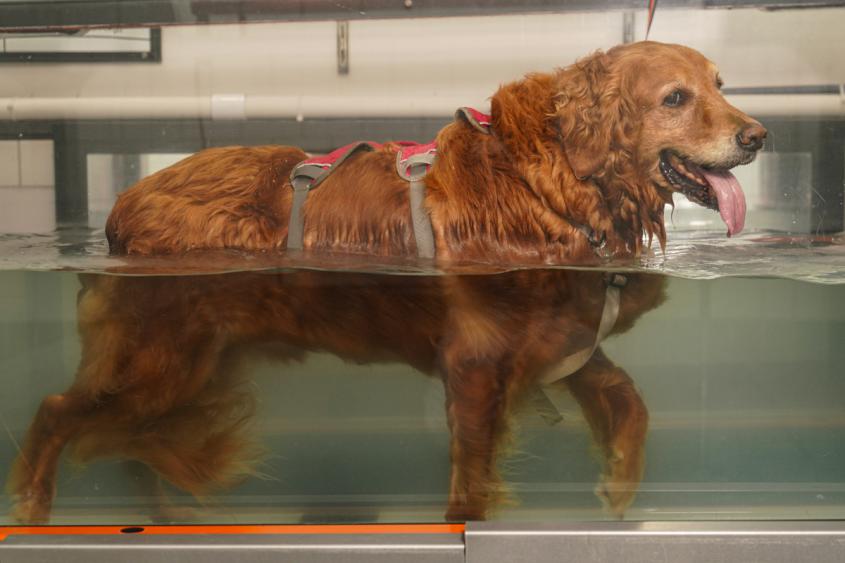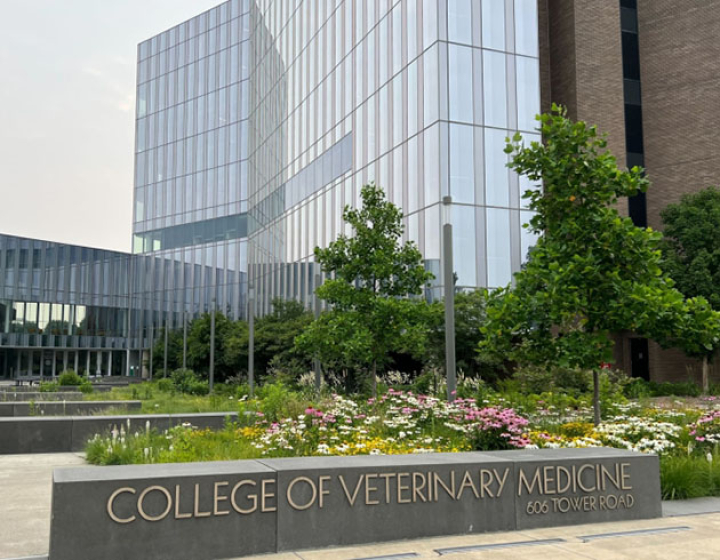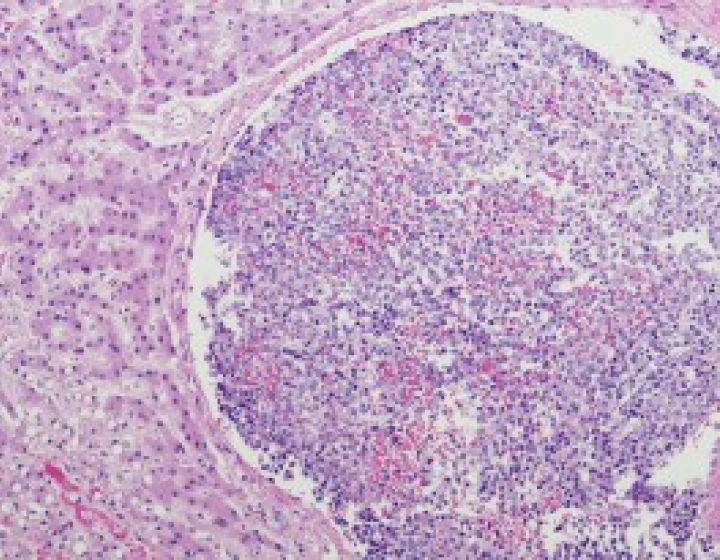Cornell’s custom care supports senior golden retriever battling two cancers
In May 2020, when the COVID-19 pandemic started, many were fearing for their own health; Darcy Brainard was worrying about the health of her golden retriever, Tebow.
Tebow was lethargic, not acting himself and losing weight, so Brainard decided to take him to her family veterinarian. “I just wanted to make sure everything was OK,” says Brainard.
Initial tests revealed that Tebow had a slow-growing cancer, called T-zone lymphoma. “T-zone lymphoma is a rare type of lymphoma making up about 10% of all lymphoma cases. Patients can present with enlarged lymph nodes and blood work changes and have no other signs or symptoms. This type of lymphoma may not require treatment until months or sometimes years later," says Corene Bruhns, D.V.M. '21, a medical oncology resident at Cornell University Hospital for Animals (CUHA). "It is recommended that patients with T-zone lymphoma be evaluated with physical exams and blood tests performed by their veterinarian every few months to monitor for progression of the disease."
In November 2021, Tebow was diagnosed with a second and more aggressive type of cancer, a lymphoblastic lymphoma, typically associated with a life expectancy of six to eight months. In need of an advanced treatment, Brainard’s veterinarian referred Tebow to CUHA where he immediately started an intense course of chemotherapy, with weekly visits to the hospital for the first two months, and bi-weekly visits after that.
The hour-long drive from Brainard’s home in the Southern Tier to CUHA was of little concern. “My son got Tebow as a puppy and when he moved away, we took care of the dog,” says Brainard. “I’m very attached to Tebow. I would do anything for him.”
Shortly after Tebow started to get very sick, Brainard’s husband Samuel was also diagnosed with a very aggressive cancer. “When he was alone, Sam was talking to the dog,” says Brainard. “He was saying: ‘Who is going to go first?’ and ‘Are we going to make it?’ ” Sadly, Samuel passed away last September.
With two cancer patients, the financial burden on the family was heavy. Tebow’s treatments were supported in part by the Petco Love and Blue Buffalo Pet Cancer Treatment Fund, which helps dog and cat owners defray the cost of chemotherapy for their pet. “We were driving with my husband, and we were so happy because getting the grant meant we could continue coming,” says Brainard.
Tebow experienced some serious side effects from one of his treatments and he had to be admitted several nights at CUHA because his neutrophils — a type of white blood cells important to fight infections — dropped dangerously low. For cancer patients, a low neutrophil count greatly increases the risk of getting a serious infection. “He was not looking good. Honestly, I wasn’t sure he would make it,” says Brainard.
Cornell medical oncology customized Tebow’s chemotherapy doses based on his situation, and he bounced back defying all the odds. "Most dogs don't experience serious negative side effects while receiving chemotherapy, and less than 5% of our patients require hospitalization," says Bruhns. "Despite the side effects, Tebow has responded better than any of us could have predicted. He is such a strong, happy dog and has had a great spirit through everything."
By the end of March 2022, the good news came: Tebow was in complete remission from his second cancer, the lymphoblastic lymphoma.
Brainard compares the quality of the care Tebow received at CUHA to the one her husband received from his doctors. “Like for my husband, [at CUHA] the focus is on the patient,” says Brainard. “All the doctors and licensed veterinary technicians in oncology, and in sports medicine, everyone has been phenomenal. Tebow’s care has been world class. I don’t have words.”
The appreciation is mutual. “Working with Tebow and with his family has been really rewarding,” says Bruhns. “Everything the family went through, we were with them.”
As Tebow progressed through his cancer treatments, his muscle and ligament strength decreased to the point where he had trouble using his hind leg; Brainard had to prop him up by pulling a towel under his belly. The veterinary team recommended underwater physical therapy with the Sports Medicine and Rehabilitation Service at the hospital.
The results have been positive. After sessions with this team, his mobility greatly improved. “When I tell him, ‘We are going to go swimming, we are going to see the girls’, Tebow starts wagging his tail,” says Brainard.

Recently, Tebow was able to ride in Brainard’s truck and enjoy some vacations at the beach. Tebow continues to take an oral chemotherapy drug on a regular schedule to keep the T-zone lymphoma from progressing. Now 12 years old, he enjoys life, taking it one day at a time, peacefully watching other dogs and Brainard’s grandchildren play. “He is just content watching them on his leash,” says Brainard.
Bruhns shares this happy ending with the family and says Tebow surpassed everybody’s expectations. "It has been so rewarding to share this experience with Tebow's family and see him continue to surpass our expectations at each visit."
Written by Elodie Smith






